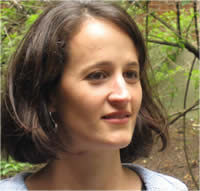[ensemblevideo contentid=s3jw_onE6UOspKNRxMbelg audio=true showcaptions=true displayAnnotations=true displayattachments=true audioPreviewImage=true]
“The pleasure is in my hand as I draw his features. I particularly like this silent stirring, the swelling of the air between my hands and my eyes and my eyes and my subject, and I savor it much as the captain lingers over a fiery red pepper, which he eats in judicious little bites right down to the stem.” John Lewis Krimmel on board the Sumatra, sailing from Rotterdam, August 11, 1818 [from Lion and Leopard]
“It took me some time to to digest the deception. Nay, it should be called a thievery. Whatever Krimmel’s point, whether to denigrate me or my Museum, or perhaps, the practice of democracy as some foreigners are inclined to do, I realized my son had been right to warn me about the German.” Charles Willson Peale outside the Pennsylvania Academy of Fine Arts, 10th and Chestnut Streets, September 25, 1818 [from Lion and Leopard]
———-
John Lewis Krimmel drowned in a Millpond near Germantown, not far from the farm of Charles Willson Peale, on July 15, 1821 at the age of 35. A genre painter, he was at the height of his artistic powers at the time of his death. His life and death served as the inspiration for Nathaniel Popkin’s new book Lion and Leopard, a novel that illuminates the world of early 19th century Philadelphia.
America’s first city at the time, Philadelphia was also the epicenter of its art world and a place that witnessed debates, controversies, and rivalries that contributed to the birth of an American culture. Sandwiched between the revolutionary generation and the coming of the industrial revolution, Popkin’s Philadelphia is a rich brew of men and women, family strife, youthful passion, foreign emigres, and institutional intrigue.
It was a time in which the young United States was still in a very fluid state and anything was possible, it was time when three youths from the small town of Easton, Pennsylvania set off for big city Philadelphia, with dreams of writing a book on the American masters and seeing the world.
On the 193rd anniversary of John Lewis Krimmel’s untimely death, I spoke to Nathaniel Popkin about his novelistic debut, LIon and Leopard.
Audio Embed Code



